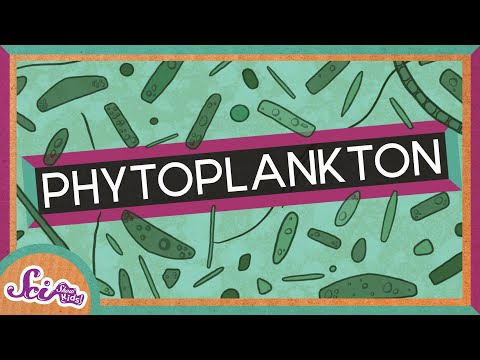Thanks for letting me use your microscope Squeaks!
吱吱,谢谢你让我用你的显微镜!
I wanted to look at the sand we collected when we were out playing by the pond.
我想看看我们在池塘边玩耍时收集的沙子。
Look, I'll put what I can see through the microscope up on the screen!
看,我要把我透过显微镜看到的东西放到屏幕上!
You can see teeny shells and lots of little crystals!
你可以看到微小的贝壳和许多小晶体!
Oh sure! We can look at that pond water you collected, and maybe figure out why it's green!
哦,是的!我们可以看看你收集的池塘水,或许能弄明白它为什么是绿色的!
Oh wow, look at all that green stuff! This water is full of living things. Do you know what those are?
哦,哇!看这些绿色的物质!这个水里都是生物,你知道它们是什么吗?
Those are called phytoplankton! And they're really important to all living things.
它们叫“浮游植物”,对所有生物都非常重要。
Phytoplankton are a type of plankton—which is just a fancy science word for the super small things that live in water.
浮游植物是浮游生物的一种,“浮游生物”是一种生活在水里的超小生物的花哨的科学术语。
Most of them are so small, you need a microscope like this to see them.
它们大多都很小,你需要像这样的显微镜才能看到它们。
And some phytoplankton are tiny plants. But there are also other kinds, including special types of bacteria.
有些浮游植物就是微小的植物,但它们也有其他种类,包括特殊类型的细菌。
They're different from the germ bacteria you might have heard about that can get into cuts and scrapes and get you sick.
它们不同于你可能听说过的细菌,细菌会进入伤口和擦伤处,让你生病。
These bacteria can't live inside our bodies.
这些细菌无法在我们体内生存。
Instead, like other phytoplankton, they just float around in bodies of water, from ponds to lakes and even oceans.
相反,它们像其他浮游植物一样只是漂浮在水体中,比如池塘、湖泊甚至海洋。
In fact, there can be tens of thousands of them in a single cupful like this.
其实,像这样的杯子里可能会有成千上万个细菌。
And that's usually a good thing, because they're kind of like miniature plants.
这通常是一件好事,因为它们有点像微型植物。
See, trees, bushes, and those green phytoplankton in your pond water all do something called photosynthesis.
你看,树木、灌木和池塘里的绿色浮游植物都会进行光合作用。
That's where they take light from the sun and use it to make food for themselves.
它们会从太阳那里获取光并用光为自己制造食物。
And when they do this, they also make oxygen — which is an ingredient in our air that we need to breathe!
它们在这样做的时候,同时也会制造出氧气——就是我们需要呼吸的空气里的一种成分!
Yeah! Exactly! Every time you take a deep breath — you're breathing in oxygen!
耶!正是如此!你每次深呼吸时——都会吸入氧气!
Just like all the plants that live on land, those tiny phytoplankton make that oxygen.
就像所有生活在陆地上的植物一样,这些微小的浮游植物会制造氧气。
In fact, there are so many phytoplankton that every year, they make half or more of all of the oxygen that's made.
事实上,浮游植物的数量非常多,以至于每年产生的氧气有一半甚至更多都是由它们产生的。
And that's especially cool since, if you were to weigh all the phytoplankton in the world and all the land plants, the land plants would weigh 450 times more!
这非常酷,因为如果你要称世界上所有浮游植物和陆地植物的重量,陆地植物会是浮游植物的450倍!
I know, right? That's a lot of oxygen coming from such little creatures!
我知道,是吧?这么小的生物竟然能提供这么多的氧气!

They're actually why we have oxygen to breathe in the first place.
它们其实就是我们一开始需要呼吸氧气的原因。
A really long time ago, there wasn't really oxygen in the air.
很久以前,空气中没有氧气。
Then, some plankton started using that photosynthesis process we talked about, so they started making oxygen.
后来,一些浮游生物开始进行我们讲过的光合作用,所以它们开始制造氧气。
That oxygen built up over millions of years—so most of the oxygen that's now in the air came from phytoplankton!
这些氧气积累了数百万年,所以现在空气中的大部分氧气都来自浮游植物!
How cool is that?! So any time you take a deep breath… you can thank phytoplankton!
多酷啊?!所以在你深呼吸的时候……你可以感谢一下浮游植物!
Now, that's not the only reason phytoplankton are so great.
然而,这并不是浮游植物伟大的唯一一个点。
They're also really important to everything that lives in the water with them, because they're an important source of food.
们对生活在水里的所有生物也很重要,因为它们是重要的食物来源。
I know, they're really small, so they don't seem like they'd fill you up much.
我知道,它们真的很小,看起来不像能填饱你肚子的样子。
But there are animals that are really small, too, like certain kinds of fish and shrimp.
但也有一些动物非常小,比如某些鱼类和虾。
They eat phytoplankton like we might eat carrots or celery.
它们吃浮游植物就像我们吃胡萝卜或者芹菜一样。
Then those little animals are eaten by bigger ones, which are eaten by bigger ones, and so on.
然后这些小动物被大动物吃,大动物又被更大的动物吃,以此类推。
So without phytoplankton, there wouldn't be small animals, which means there wouldn't be food for big animals.
所以没有浮游植物,就不会有小动物,这就意味着大动物就不会有食物。
And our ponds, lakes, and oceans would be a lot more empty!
我们的池塘、湖泊和海洋也将更加空旷!
Oh yeah! The animals in the pond depend on these little phytoplankton. So I think it's a great idea to put them back.
哦,是的!池塘里的动物依赖于这些小小的浮游植物。所以我觉得把它们放回去是个好主意。
How about I come with you? I want to see all the other amazing creatures living in the pond with them!
我和你一起去怎么样?我想看看和它们一起生活在池塘里的所有其他神奇的生物!
So goodbye for now! If you want to keep learning and having fun with Squeaks and me, hit the subscribe button, and we'll see you next time here at The Fort!
所以现在再见啦!如果你想继续学习,与我和吱吱共度美好时光,请点击订阅按钮,咱们下期再见!











